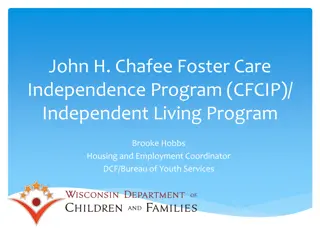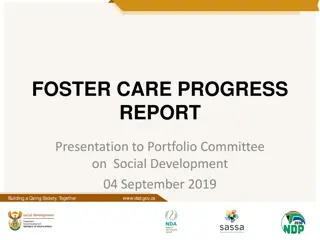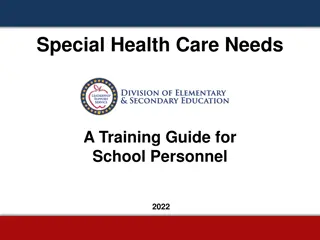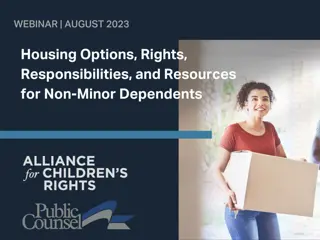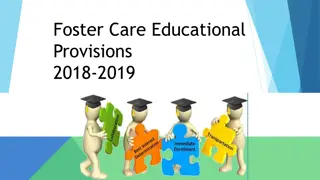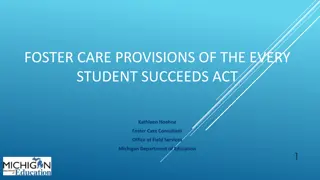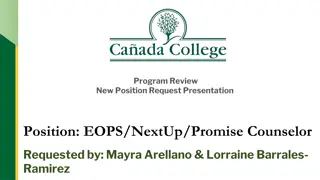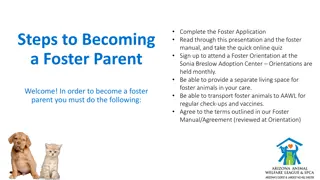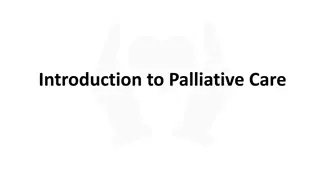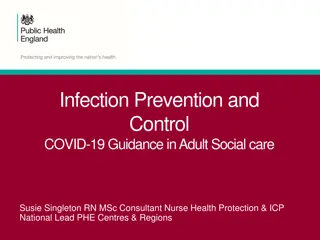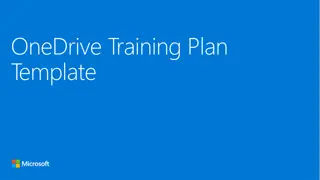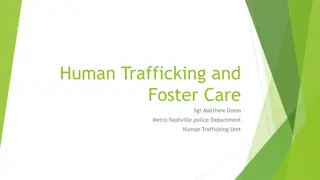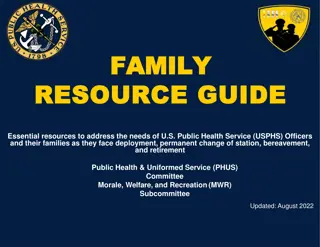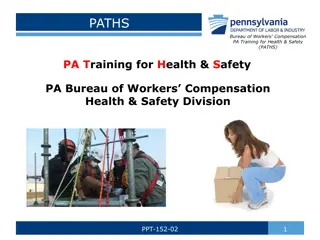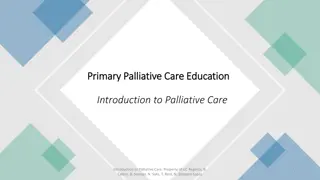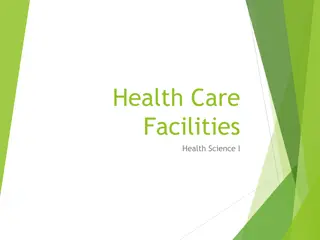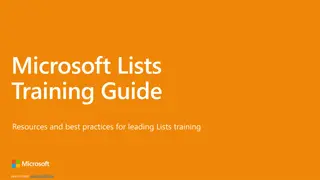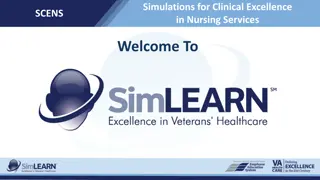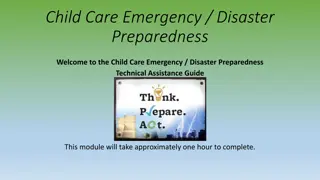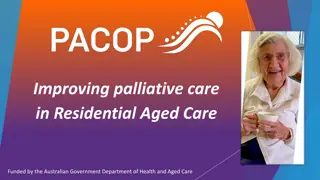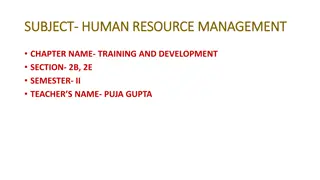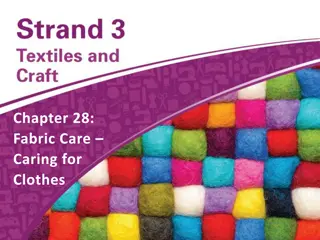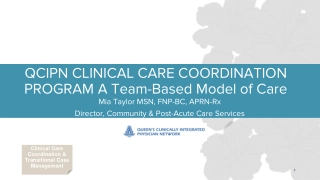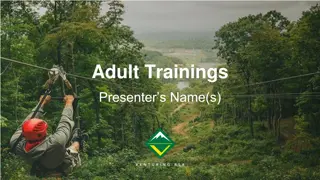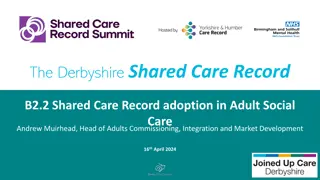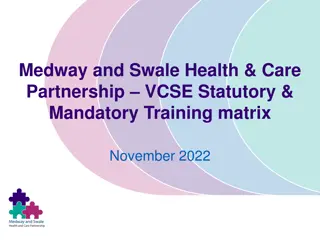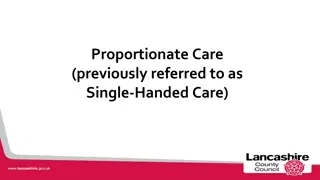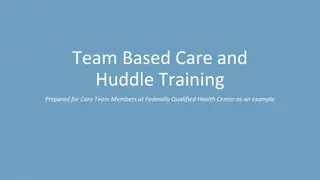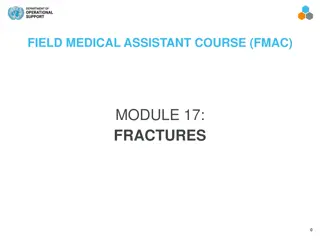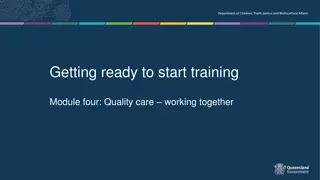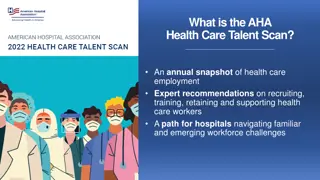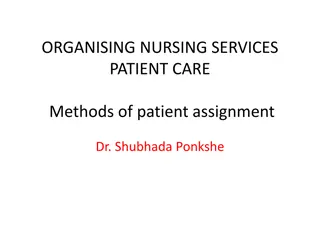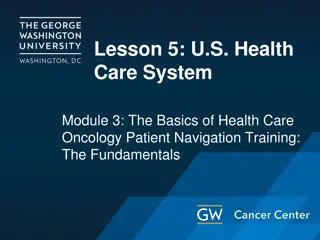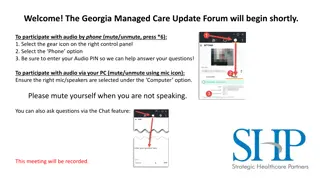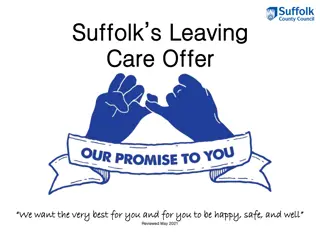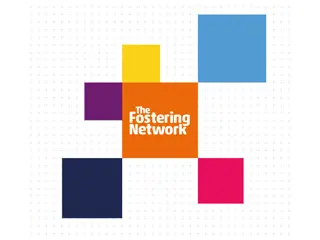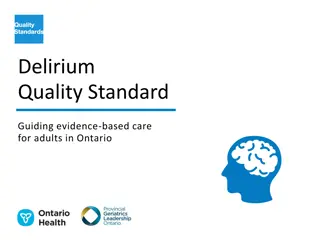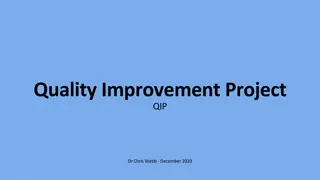Comprehensive Guide to Foster Care Training and Resources
Delve into the world of foster care with this comprehensive guide aimed at assisting foster parents in their fostering efforts. Explore essential resources, protocols, and support systems available for navigating the foster community effectively. Learn about the hotline process, fostering outcomes, ambassadors' roles, and the importance of foster parent ID cards for discounts and identification.
Download Presentation

Please find below an Image/Link to download the presentation.
The content on the website is provided AS IS for your information and personal use only. It may not be sold, licensed, or shared on other websites without obtaining consent from the author. Download presentation by click this link. If you encounter any issues during the download, it is possible that the publisher has removed the file from their server.
E N D
Presentation Transcript
FOSTER CARE 101 Pre-Service Training
INTRODUCTION OF MATERIAL To assist Foster Parents with the process and understanding of their fostering efforts. We will provide resources that can be sought out and utilized as you foster. We will provide you with a foundation for navigating the foster community. To define key protocols
Childrens Division Website www.dss.mo.gov/cd CHILD WELFARE MANUAL CHILD WELFARE MANUAL DSS MANUALS (MO.GOV) I AM A FOSTER PARENT PAGE (TRAININGS, RESOURCES, ETC.) CHILDREN'S DIVISION | MISSOURI DEPARTMENT OF SOCIAL SERVICES (MO.GOV) HOW TO SIGN UP FOR THE CD NEWSLETTER ONCE YOU VISIT THE I AM A FOSTER PARENT PAGE A POP UP WILL APPEAR AND YOU MAY PUT YOUR EMAIL IN AND CLICK SUBMIT FAMILY RESOURCE CENTERS CHILDREN'S DIVISION | MISSOURI DEPARTMENT OF SOCIAL SERVICES (MO.GOV) HOW TO ACCESS E-FORMS DEPARTMENT OF SOCIAL SERVICES - EFORMS (MO.GOV) FOSTER PARENT HANDBOOK CHILDREN'S DIVISION | MISSOURI DEPARTMENT OF SOCIAL SERVICES (MO.GOV)
The Hotline Process WHAT TO EXPECT IT IS NOT UNUSUAL TO BE HOTLINED, DO NOT BE ALARMED FOLLOW ALL INSTRUCTION FROM THE INVESTIGATOR, IT IS A PROCESS THEY HAVE TO FOLLOW BY LAW AND THEY HAVE 45 DAYS TO COMPLETE THE INVESTIGATION. THE CHILDREN COULD BE MOVED DURING AN ACTIVE INVESTIGATION, THIS IS NORMAL, THIS DOES NOT MEAN GUILT, JUST A SAFETY PRECAUTION. WHAT ARE THE POSSIBLE OUTCOMES UNSUBSTANTIATED-NO CHILD ABUSE/NEGLECT FINDINGS SUBSTANTIATED-THERE WERE FINDINGS OF ABUSE/NEGLECT WHERE TO FIND SUPPORT GROUPS ASK YOUR LICENSING WORKER OR A FOSTER CARE AMBASSADOR MOST CIRCUITS HAVE A LOCAL FOSTER SUPPORT GROUP, THEY CAN HELP PROCESS OR TALK THROUGH SIMILAR SITUATIONS.
AMBASSADORS AND MENTORING In a statewide effort to recruit sincere and dedicated foster parents, Foster Care Ambassadors have valuable insight and/or experience into foster care and are passionate and willing to help recruit, support, and advocate for the cause. They have thorough knowledge of Children s Division policies as well as the state statutes and are able to answer questions from potential foster parents or interested individuals in the community. Foster Care Ambassadors are available to speak at or host their own recruitment events and also serve as mentors to new foster parents. Visit Children's Division | Missouri Department of Social Services (mo.gov) to learn more.
FOSTER PARENT ID CARDS You should receive an application and instructions for the ID card from your Licensing worker What to do if you lose one Let your Licensing worker know ID cards are beneficial to receive certain discounts and/or when visiting places
PAYMENTS Amounts See attached Maintenance Sheet for payment information, this can change with Legislation Changes Direct Deposits (CD-122) Ask for a Direct Deposit Form when you sign Contracts. Could take 30+ days to go into effect. Your first check could be a paper check. Everyone should utilize direct deposit What to do if you are not paid Contact your worker. They might have to assure payments are correct and FACES entries are correct. They can request a repayment. What to do if you are over or under paid Contact your worker. They can submit a payment request for underpayments. They can also set up a payment plan for any over-payments.
RESPITE VS BABYSITTING Forms CM-10 (Cooperative Agreement for the Purchase of Foster Respite Care Services) CD-110 (Child Information form for Respite Provider) CD-111 (Respite Provider Evaluation/Payment Invoice Units A unit of respite care is defined as a minimum of 12 hours up to a maximum of 24 hours overnight, daily or on a weekly basis. A provider may also use a half unit of respite care. A half unit is a minimum of six (6) hours up to 12 hours overnight, daily or on a weekly basis. Timeframe-how time is counted Use of respite care is not to exceed 12 units per child during a 12 month period of time. The 12 month period will begin on the date that the child was placed in the resource provider s home. The 12 units will reset upon the anniversary date of the child s placement. Unused units for the previous 12 month period are not rolled over to the new 12 month period. At any time a child is placed in a new provider s home, the respite units reset for that child at the new placement. What constitutes babysitting Respite is not for use in regular child supervision situations when a parent would normally use ordinary child care, i.e., hiring a baby-sitter for an afternoon or evening outing, attending foster parent training or seminars, community foster youth/family events, and/or appointments. If you need child care so you can attend a pre-service or in-service training, you may be eligible for reimbursement at a rate of $2 per hour per child, including biological children.
LIFEBOOKS What they are used for Lifebooks are a tool that foster parents can use to help children better understand their past and how it connect to their present situation as well as express their thoughts and feelings and share important details about their birth families. A lifebook can offer ways of tracking placement histories. Lifebooks are created for foster children to tell their story much like a scrapbook. It is a record of a child s memories, past and present, in his or her own words. As a child moves through foster care, oftentimes his or her life story gets lost. The Lifebook pages are used to document important events and celebrations, honoring a child s life. How to develops one There is really no right or wrong way to create one. There are some really good examples on the internet. Help your child collect pictures, record memories, and write down his or her feelings. Work with your child and be creative! Different ideas-what to include Pictures (baby, family, school, locations, previous foster families, friends), birth information (hospital, date of birth, weight, length), family tree, report cards, art work, shot records, awards, events they participated in, medical history (self and family). Journal entries by the child. Questions by the child; what is my favorite food, what do I want to be when I grow up, what makes me happy, what makes me angry, who are my friends I like to hang around with?
LICENSING RENEWAL PROCESS When is it done Your intial license is dated for two years. Your worker should contact you 4-6 months before renewal to start working toward the renewal process, but you should be aware of when it expires and what training you needed. What you need to do Assure all training has been completed, complete all necessary forms, physicals, and references included in the renewal packet. Training hours A Traditional Foster Home needs 30 hours per licensing period of In Service Training. Some are required training each year. Training can be provided by CD, contracted agencies, or conferences. There are other avenues to get training such as movies or books which have to be pre-approved by the licensing worker (limited hours allowed). Background checks-what is done every 2 year and every 6 years Initially you will have Fingerprint Backgrounds, a FCSR check, a Sex Offender Check and Child Abuse/Neglect Check. Every two years your worker will complete the FCSR, Sex Offender and CAN Checks. Fingerprints are in Rapback. Every six years you will do Fingerprint checks again.
MILEAGE Forms CD-106 (Travel Expense log for Children in Foster Care) State rate The reimbursement is at the current state mileage rate at the time of the travel. What is reimbursable Medical care (ex. doctor, dentist, eye, WIC appointments, etc.), Counseling (ex. mental health appointments, etc.), Family Visits, Court, FST and PPR meetings, and Respite. Reimbursement is typically based on a round trip. Transportation costs for any level of care for child care services (daycare, preschool, etc.) is NOT an allowable cost, even if such services are part of the child s case plan. When there is more than one youth being transported for a trip, the trip mileage must be divided between each of the youth who were on the trip. When to submit Submit the form to the worker within thirty (30) days of the month that the trip occurred.
TO DO LIST. Schedule child medical and dental appts within 24 hours Know the child's key team members and contact information (GAL, DJO, Case Manager, Supervisor, Therapist, etc.) Attempt to have all school-aged children registered within a week Obtain a Placement Letter immediately from worker. Use as needed
CLOTHING ALLOWANCE Amounts (Per year-12 months) 0-5 ($320.00) 6-12 ($400.00) 13 and over ($700.00) Timeframe-how time is counted The 12 month period will begin on the date that the child was placed in Alternative Care. The 12 month reset is the anniversary date of when the child came into Alternative Care.. Unused money for the previous 12 month period are not rolled over to the new 12 month period. Reimbursement PLEASE check with the local county for individual protocols. When to submit them PLEASE check with the local county for individual protocols. Clothes bought for the child STAY with the child.
FORMS How to get them Give some during the training CS-10 Medical Needs Form for Youth Caregiver court Information CD-114 Other Training approval CD-106 Mileage Respite CD-110 (Child Information form for Respite Provider) and CD-111 (Respite Provider Evaluation/Payment Invoice)
IN SERVICE TRAINING What qualifies for In-Service trainings Children s Division provides Modular Training throughout the year as well as Contracted Agencies. If you find Other Training or Conferences it must be pre-approved before you attend. How many hours for each licensing period 30 hours for a two year licensing period for a Traditional Foster Home. It is best to try and get 15 per year and do not wait until your license is coming up for renewal. How to request other in-service trainings (CD-114) Using the form, fill it out for training you wish to attend outside of CD. Turn it in to your Licensing Worker for prior approval and amount of hours allowed What trainings are mandatory Foster Parent/Relative Training, Psychotropic Medication Training, Informed Consent, Secondhand Smoke, CPR and First Aid, Introduction to Foster Parenting, HIPAA, Foster Parent Bill of Rights, Prudent Parenting, Respite
COURT Caregiver court information form All foster parents have the option to fill this form out two weeks prior to court and get to the Juvenile Officer of the case to make part of the court exhibits. It is suggested to email a copy to all parties. Ask your worker for this form, they should provide it to you. Etiquette and Expectations of Court All courts are different, but most will allow foster parents to sit in the court room during a court hearing. Dress appropriately, turn phones off, stand up when Judge enters court room, stay quiet and only answer questions asked of you. Not all foster parents testify, but you could be called at any time to do so. It is recommend you attend court so you know first hand the case plan and discussions.
VISITS You do not have to supervise visits, but a worker could request you assist, if the court is in agreement. How to prepare the children for visits What are the expectations and guidelines when supervising a visit What to expect after a visit
RESOURCES SPECIFIC TO COUNTY/CIRCUIT Support groups Local organizations and discounts Childcare or Mental Health Agencies
SELF CARE TIPS Make Sleep a Priority Relaxing Activities Practice Gratitude Focus on Positivity Eat Heath, Regular Meals and stay Hydrated Get regular exercise (30 mins of walking every day will help your mood)
QUESTIONS AND ANSWERS Open discussion
TRAINER INFORMATION DISCLAIMER This class will be Session 10 of MO C.A.R.E. and will consist of 3 hours of overview and discussion.


